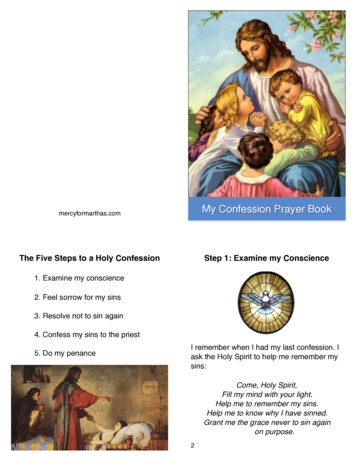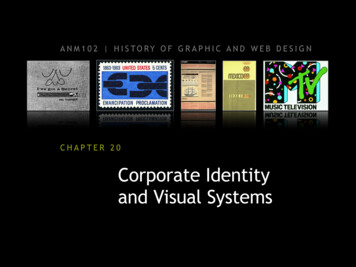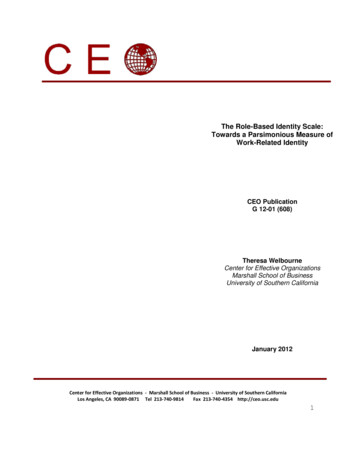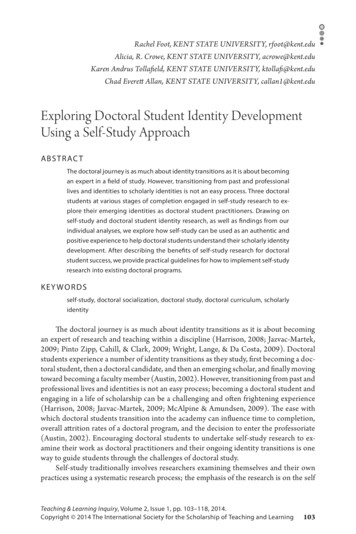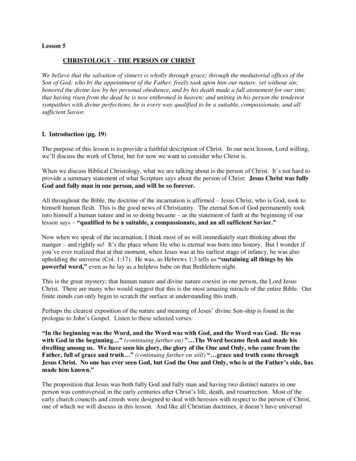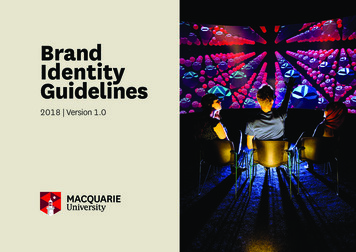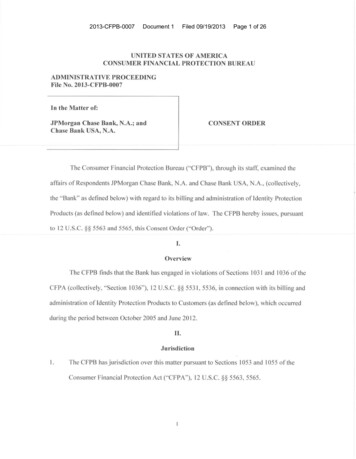
Transcription
APRIL 2016If anyone is in Christ, the new creation has come:The old has gone, the new is here!2 Corinthians 5:17OUR IDENTITY IN CHRISTA devotional from
m ay 2 3 – 2 7 , 2 0 1 6p ast orscon f eren ce.com
Join church and ministry leaders from around the country for a weekof great preaching and encouragement. Pastors’ Conference is a timefor men and women to be refreshed and equipped for ministry.pa sto r s ’ C o n f e r e nc e S p e a k e r sPaul NyquistPresidentMoody Bible InstituteD. A. HortonUrban Church PlanterJames MacDonaldWalk in the WordRalph WestPastorThe Church Without Wallsn e w t h i s y e a r : e n g a g e t h e c u lt u r eA two-day forum equipping leaders to biblically navigate changingtimes. Hear popular authors and speakers like John S. Dickerson,Darrell Bock, Tony Evans, and Al Mohler.John S. DickersonThe Great EvangelicalRecessionDarrell BockDallas TheologicalSeminaryTony EvansThe Urban AlternativeAl MohlerThe Southern BaptistTheological SeminaryR e g i st e r to d ay !Visit pastorsconference.com or call(312) 329-4407.Aaron ShustWorship Leader
TODAY WITH DR. PAUL NYQUISTPresident of Moody Global MinistriesChild of the KingMy older sister hastraced our family’sgenealogy all theway back into the1600s. The nameNyquist means “newbranch” or “new twig”in Swedish (it would be written Nykvisttoday in Sweden). My great-grandparentsemigrated from Sweden in the 1880s,around the same time D. L. Moody beganhis Bible school in Chicago, and startedfarming in a Swedish area of Burt County,Nebraska. My dad is a full-bloodedSwede—and looks just like it! My Mom ishalf Swedish and half French.Not every family is able to trace theirhistory back this far. While we may befascinated to learn bits and pieces ofour earthly ancestry, if we know Christwe can be certain of our heavenlyheritage. Through the redemptionfound in Christ Jesus, we have becomethe sons and daughters of the King.Through the salvation found in Christ, weexchanged the limitations of our earthlyidentity for an eternal one: “See howgreat a love the Father has bestowed onus, that we would be called children ofGod; and such we are” (1 John 3:1). Godloved us and redeemed us.In 2 Corinthians 5, Paul contrasts ourearthly existence with the spiritual(800) 356-6639regeneration and eternal hope thatcomes from being born again. Hecompares our physical existence to atemporary tent. “For we know that if theearthly tent which is our house is torndown, we have a building from God” (v. 1).In Christ, we exchange the old for thenew, the imperfect and incomplete forthat which is incorruptible. In Christ,Paul explains, we become a newcreation: “The old things passed away;behold, new things have come” (v. 17).We can be thankful that God’sregenerative work in us has nothingto do with our earthly heritage or ourpersonal accomplishments. No matterwhether your ancestors were royaltyor peasants, no matter what continentyour family of origin claimed, we allneed God’s salvation through Jesus inorder to be part of His family. In Him,we are made new.It can be interesting to seek our roots,to discover more about the places andpeople from which we came. But wemust never forget who we are in Christ.In Him and through Him, old thingshave become new. We are no longerslaves to sin, but we have an eternalfuture secure in Christ. We are a newcreature, perfected in Christ, a child ofthe King. In Him, we are complete. n
THEOLOGY MATTERSby Dr. John KoesslerThe Dimensions of SalvationSalvation is both an act of God anda personal experience. As an act ofGod, the term salvation describes whatGod has done for us through JesusChrist. As an experience, it refers tothe application of this salvation to usthrough the Holy Spirit. Both have theirorigin in God’s mercy and are not theresult of our good works.The saving act of God was the deathand resurrection of Jesus, who lived asinless life and suffered on the cross.Christ was punished for our sin in Hisdeath. His resurrection was the proofGod had accepted that suffering on ourbehalf. Since our salvation is the resultof this historical event, we describe itin the past tense (Eph. 2:8; 2 Tim. 1:9).Those who have put their faith in Christare already saved.But salvation is also a presentexperience. It is being applied to us“through the washing of rebirth andrenewal by the Holy Spirit” (Titus 3:5).When we place our faith in Jesus Christ,something about us changes. The HolySpirit begins to free us from the effectsof sin. We are given a new capacityto say no to sin and an ability to resisttemptation. This dimension of salvationis progressive. Through the working ofthe Holy Spirit in our lives, we grow inthe grace and knowledge of our Lordand Savior Jesus Christ (2 Peter 3:18).Consequently, we can say that thosewho are in Christ are in the process ofbeing saved.In eternity when this work of transformation is finally complete, we will beas holy in practice as we are in position.The righteousness we have receivedas a gift of grace through Christ willbe evident in our character and ourbehavior. Because Christ paid the fullpenalty for our sins, we will also escapethe punishment that otherwise wouldhave been ours. This means that wemay also think of salvation as a futurehope. We will be saved from God’s wraththrough Jesus Christ (Rom. 5:9). As faras Christ’s work is concerned, salvationis a finished work. When it comes to ourexperience, salvation is a process. Butour hope for the future is certain. Wewill be saved. nFOR FURTHER STUDYTo learn more, read So Great Salvationby Charles Ryrie (Moody Publishers).TODAYINTHEWORD.COM
FROM THE EDITORSby Elena MafterThe Blood of the LambStarting with sunset on April 22 thisyear, until the end of the month, Jewishpeople will greet each other, “ChagPesach Sameach!” or simply, “ChagSameach!”—Happy Holiday. Pesach,or Passover, one of the most importantholidays in the Jewish calendar,symbolizes the escape from physicaland spiritual slavery. The PassoverSeder, a feast in the community orfamily, involves the retelling of thestory of Israel’s exodus from ancientEgypt. This ritual meal also reminds theJewish people that they were savedby the blood of the lamb, put on thedoorposts of their houses. The angelof death passed over the dwellings ofGod’s people.Passover has deep significance forChristians as well. Just as the Jewishpeople relied on the blood of thesacrificial lamb, Christians also rely onthe blood of the Lamb—God’s Son—for salvation. As we learn about ouridentity in Christ this month in Today inthe Word, let’s remember the price thatChrist paid with His precious blood forour exodus from the slavery of sin andour freedom as His people. Passover isstill valid for God’s people, both Jewishand Gentile, and it’s an opportunity forChristians to appreciate the Jewishroots of Christianity.(800) 356-6639On December 2, 2015, the Moodycommunity on our Chicago campushonored God’s Word and the Jewishpeople who helped preserve it. Ata special dedication ceremony,attended by students, staff, Moody’sleadership, and many guests includingthe Consul General of Israel to theMidwest, Moody received a rareoriginal of an eighteenth-centuryTunisian Torah scroll.Dr. Scott Carroll, the curator of thescroll and expert on ancient/medievalmanuscripts, explained that the termTorah has a wide range of meanings,one of which is “the embodiment of theteaching of the Law, from Genesis toDeuteronomy, which encapsulates thesoul of Judaism.” Due to several factors,perhaps corrections and defects, thisparticular Torah scroll can no longer beused for Jewish liturgical purposes. Butit will be widely used by Moody’s facultyand students of Hebrew to read thestory of Exodus so faithfully preservedand retold by the Jewish peoplethrough millennia. nTo learn more about the donation of theTorah scroll to Moody and thededication ceremony, please visit ourwebsite: moodyglobal.org/news.
VOLUME 29 ISSUE 4EXECUTIVE EDITORBruce EverhartCONTENT STRATEGYGeorgia JosephEDITORHelen MolineMANAGING EDITORHeather MoffittASSOCIATE EDITORElena MafterCONTRIBUTING EDITORSJamie JanoszJohn KoesslerWRITERSDevotionals: Heather MoffittQ&A: Rosalie de RossetART DIRECTORLynn GabalecGRAPHIC DESIGNERSLarry Bohlin, Dana ChenBUSINESS MANAGERPaul B. CurrieMOODY GLOBAL MINISTRIESPRESIDENTJ. Paul NyquistPROVOSTJunias VenugopalEXECUTIVE VICE PRESIDENTSteven MogckSENIOR VICE PRESIDENTGreg R. ThorntonCHIEF FINANCIAL OFFICERKen HeulittVICE PRESIDENTSTim ArensLarry DavidhizarJim ElliottBruce EverhartChristine GorzJohn A. JelinekCollin G. LambertFrank W. Leber Jr.Paul SanthouseJames SpencerJanet StivenDebbie ZelinskiTRUSTEESChristopher DenisonOrbelina EguizabalT. Randall Fairfax (Chairman)Thomas S. FortsonManuel GutierrezJerry B. JenkinsPaul Johnson (Emeritus)J. Paul NyquistDavid SchipperJulianna SlatteryPaul Von TobelMark WagnerRichard E. WarrenRichard YookOur Identity in ChristSince the ancient Greek philosophers pronounced themaxim “Know thyself,” humanity’s quest has essentiallyremained the same throughout the centuries to thepresent day—searching for truth and identity. Thismaxim formed the foundation of modern philosophyand permeated popular culture, from the “MeGeneration” to the proliferation of personal blogs,from self-centered advertising slogans to selfies.This month in Today in the Word, we’ll learn what theBible says about our identity as Christians. We’ll seethat in order to find our true identity we need to takeour eyes off ourselves and look at Jesus. Scripturepassages from the New Testament will show us thatwe are saved and justified in Christ alone, we arecalled to be holy and mature in Christ, and we are anew creation in Him. We’ll praise God for His love,for making all things new, and for the freedom wehave in Him. We will also rejoice in our eternal destinypromised by Christ to His followers. While the things ofthis world—its philosophies, ideas, and struggles—willpass away, we will reign with Him for eternity.We pray this study will encourage you and help yougrow in the truth of who you really are as God’s child.Thank you for studying with us! nMoody Global Ministries is the sole publisher of Today in the Word, copyright 2016 by Moody Global Ministries. All rights reserved. Please direct all Todayin the Word inquiries to Donor Resource Management, 820 N. LaSalle Blvd.,Chicago, IL 60610. Scripture taken from the Holy Bible, New International Version ,NIV , copyright 1973, 1978, 1984, 2011 by Biblica, Inc. Used by permission.All rights reserved worldwide. Scripture taken from the New American StandardBible , copyright 1960, 1962, 1963, 1968, 1971, 1972, 1973, 1975, 1977, 1995 bythe Lockman Foundation. Used by permission. Printed in the U.S.A. Today in theWord is published monthly. Printed on 30% recycled paper.TODAYINTHEWORD.COM
READ ACTS 4:1–12FRIDAYAPRIL1Salvation is found in no one else, for there is noother name . . . by which we must be saved.Acts 4:12Salvation through Jesus AloneIn 2004 the BBC launched a newtelevision show that would becomea global phenomenon with nearlytwenty different versions producedaround the world. Each episode ofWho Do You Think You Are? featuresthe family history of a famous person,exploring everything from disappearedrelatives to distant royal connections toancestors’ migrations. Participants oftensay, “I hope this experience will help meunderstand myself and my family.”presented an opportunity for them topreach the message about healingand salvation found only in Jesus (seeActs 3:16). Their proclamation of thegood news of the resurrection of Jesuscaused many to come to faith in Christ,but it infuriated the religious leadersin the temple. Just when they thoughtthey were rid of Jesus, here were Hisfollowers declaring that He was alive—and they were performing miracles ofhealing in His name!This month in Today in the Word weare going to explore similar questions:Who are we? What is our true identity?What do we know about our family? Ourgoal is not just to know ourselves betterbut also to understand what it meansto locate our identity in Christ. And inorder to find the answers, we have toknow where to begin.Peter leaves no doubt what is at stakein this encounter. The religious leaderswanted to preserve their power; Peterand John preached the power of Jesusto save (vv. 7, 10). The religious leadersthought they were protecting templeworship; Peter declared that Jesus wasactually the cornerstone (v. 11; Ps. 118:22).The religious leaders tried to please Godby going above and beyond the Law;Peter preached that salvation is foundonly in the name of Jesus (v. 12).In our text today, Peter and John hadjust healed a crippled beggar, which6APPLY THE WORDPRAY WITH USTo know who we are, we must begin with Jesus.Some reject Him, and define their identity apartfrom Christ. Those who accept His salvation are inChrist, and their lives are transformed. On whichside are you? If you’ve never trusted Jesus toforgive your sins and make you right with God,today receive His salvation and new life in Christ.Our Distance Learning helps bringMoody education to the globalcommunity. Ask for God’s blessingon the work of Andrew Beaty,Ashish Varma, Janet Randerson,and Kerwin Rodriguez as theyserve in the dean’s office.TODAY IN THE WORD
READ ROMANS 4:13–25SATURDAYHe was delivered over for our sins and wasraised to life for our justification.APRILRomans 4:252Faith in Jesus ChristLike many people in the 1990s, ChrisRobinson loved Beanie Babies. Hethought the small plush toys wouldincrease in value, and he begandevoting all his spare time—andmoney—to amassing a collection. Hefigured eventually he could sell them topay college tuition. But after spendingover 100,000 on some 15,000Beanie Babies, the market for the toysplummeted, leaving Robinson with awhole lot of stuffed animals and debt.Trying to invest money can be a wisedecision, but the investment must betrustworthy. The object of our trust isimportant: faith in a worthless cure orrisky business or unreliable personwill do us no good. This is even moretrue in our spiritual lives. Merely havingfaith will not save us. Our faith must beplaced in Jesus Christ.As our text today makes clear, theobject of faith was always supposedto be God, the Giver of the Law, notthe Law itself. Only God can keep Hispromises. Only God could fulfill Hisword to Abraham to make him a fatherof many nations (v. 18).The nature of faith is believing that Godwill do what He has said He will do (v.21). This is no risky investment—God hasproved Himself faithful over and overagain. He promised Abraham a son, andthe problem of old age could not keepGod from keeping His word. He giveslife to the dead, and even though Christdied for our sins, God “raised Jesus ourLord from the dead” (v. 24)!The result of faith is being maderighteous in God’s sight. We couldnever be good enough, never keep theLaw perfectly, and never please Godwith our own efforts. We are able toenjoy salvation and a relationship withGod only by faith in His Son.APPLY THE WORDPRAY WITH USJesus is the only basis for our faith and our onlyhope of salvation. Sing or listen to a recording ofthe modern hymn “In Christ Alone” to encourageyour faith today: “In Christ alone my hope is found/ He is my light, my strength, my song / ThisCornerstone, this solid ground / Firm through thefiercest drought and storm.”Vice president and dean ofthe Undergraduate School,Dr. Larry Davidhizar, welcomesyour prayers for training Christianleaders at Moody. Pray also thatall his day-to-day decisions inleading the school would be madeaccording to God’s will.MOODY GLOBAL MINISTRIES7
READ GALATIANS 2SUNDAYAPRIL3I have been crucified with Christ and I no longerlive, but Christ lives in me.Galatians 2:20Justified in ChristWhat does justification mean? Inacademic research, justificationexplains a theory or thesis in orderto support the conclusion. In ethics,justification is the category of theoriesthat tries to answer questions like “Whyshould I be moral?” In popular usage, ifwe say a decision or action is justifiedwe mean it was an acceptable choice.But what does it mean to say we arejustified in Christ?Our passage today provides us with aclear answer. Being justified is a centralpart of our identity in Christ, and it ispart of our understanding salvationin Jesus.First, justification means we aredeclared righteous before God (v. 21).As we saw yesterday, we can neverjustify ourselves. We can never be rightwith God on our own terms. “We knowthat a person is not justified by theworks of the law, but by faith in Jesus8Christ. So we, too, have put our faith inChrist Jesus that we may be justified byfaith in Christ” (v. 16).Second, justification means we now liveby faith in Christ (v. 20). Being justifiedin Christ not only changes the statusof our relationship with God but alsotransforms the way we live. We havethe Spirit of God living within us toguide our lives. We can embrace gracerather than legalistic ideas of how toplease God.Justification also matters for ourrelationships with others. If we graspthat our identity of being justified inChrist is entirely based on what He hasdone for us—not our own goodness—then we can extend that grace toothers. We don’t have to imposeadditional restrictions or expectationson others when we know that Jesusdoes the work of justification for all whobelieve in Him (vv. 4, 21).APPLY THE WORDPRAY WITH USPeter and Paul clashed over associating withGentiles. Disagreement between Christians is notnew and need not mean breaking fellowship. Indisagreements, the gospel takes priority over ourpreferences. Paul confronted Peter for choosingLaw over grace; Peter later became a persuasiveadvocate for Gentile believers (vv. 11–14; Acts 15).Today, would you lift up in prayerour undergraduate faculty in thePastoral Studies department?Pray that the Lord would guideKirk Baker, Michael Boyle, andJohn Koessler as they train theirstudents to serve Him as faithful,godly pastors.TODAY IN THE WORD
READ 1 CORINTHIANS 1:1–9MONDAYHe will also keep you firm to the end,so that you will be blameless.APRIL1 Corinthians 1:84Called to Be HolySteeplechase runner Tangquy Pepiotlearned the hard way about finishing arace well. In a competition in 2015 hewas well ahead of the other runnersentering the final home stretch. Aboutthirty meters from the finish he beganwaving his arms for the crowd to cheerhis impending victory. But as he slowedto soak in the adulation, another runner,Meron Simon, caught up and passedPepiot at the finish line. Pepiot lost by.10 seconds.We’ve seen the importance of basingour identity on being saved in Christ.But being justified isn’t the end of ourstory; it is not the finish line of ourspiritual race. For the rest of the weekwe’ll examine what it means to knowthat we are also sanctified in Christ.The opening verses of our readingtoday provide us with the simplestunderstanding of sanctification. It isthe work of God to make us holy (v. 2).Being justified in Christ allows us to bein a relationship with God, and beingsanctified in Christ transforms our livesto look more like Jesus.We cannot save or justify ourselves,and we also cannot sanctify ourselves.Sanctification is not about our ownstriving to impress God. Rather, it is thework of God’s grace in our lives (v. 4).This grace includes blessing us withspiritual gifts that we are to use to serveothers and glorify God. This marvelous,divine process of God giving us giftsthat we in turn use for Him will produceholiness in our lives (vv. 5–7).Ultimately all the credit for oursanctification belongs to God. He isfaithful. He calls us into fellowship. AndHe keeps us strong to finish our racewell. Jesus secures the victory of ourholiness (v. 8).APPLY THE WORDPRAY WITH USAre you feeling weary in your spiritual race?Does the call to holiness feel like a burden? Yoursanctification is rooted in God’s grace to you. Taketime to thank the Lord for His gifts, and then askhow you can use those gifts to serve Him. Ourholiness results not from our effort but from ourresponse to what Jesus is already doing in our lives.Keeping our Pastoral Studiesprofessors in prayer, pleaseadd Pamela MacRae, WinfredNeely, Laurie Norris, and WilliamTorgesen to your list. May Godstrengthen and encouragethem in their fruitful ministry onMoody’s Chicago campus.MOODY GLOBAL MINISTRIES9
READ PHILIPPIANS 1:1–11TUESDAYAPRIL5This is my prayer: that your love may abound moreand more in knowledge and depth of insight.Philippians 1:9Fruit of RighteousnessJesus changes lives. After an encounterwith Him, Zacchaeus committed torepaying everyone he had cheatedand gave half his possessions to thepoor. Peter was transformed from areckless fisherman who denied Christto a bold preacher of the gospel wholed thousands to faith in Jesus. AndPaul changed from leading a zealouspersecution of the church to becominga missionary who planted churches andtook the gospel to Europe.Our identity in Christ will producewhat the apostle Paul calls “the fruitof righteousness” (v. 11). Salvationthrough Jesus made us righteous, andsanctification in Christ is the process ofseeing the fruit or evidence.Paul gives several examples of thisfruit in the opening verses of his letterto the church in Philippi. First, theywere partners with him in the work ofsharing the gospel (v. 4). Despite thestruggles and persecution that Pauldescribes later in the letter, this churchwas committed to the good news ofsalvation through Jesus.Second, the church supported Paul(v. 7). They shared financial resourceswith him and answered the call tosend gifts to the persecuted churchin Jerusalem. The Philippians alsoembraced missionaries like Timothyand Epaphroditus, which allowed theministry of spreading the gospel andstrengthening the churches to flourish.Finally, the church was growing in bothlove and spiritual discernment (v. 10).They weren’t perfect—Paul addressesdoctrinal and relational concerns later—but this growth was evidence that Jesuswas working in them and they wereusing the gifts they had for the “gloryand praise of God” (v. 11). Because theiridentity was rooted in Christ, they hadconfidence that He would sustain them.APPLY THE WORDPRAY WITH USAre you supporting missionaries in the ministryof spreading the gospel? Financial supportis important, and a commitment to pray for amissionary is invaluable. Missionaries love receivingregular emails or letters, and remembering theirbirthdays and holidays with special cards or carepackages can be tremendously encouraging.Bruce Everhart, VP of DonorDevelopment and ChannelStrategy, works hard to keepMoody connected with our friendsaround the world. Ask God to giveBruce and his teams insight andinspiration in the various avenuesthey reach the Moody family.10 TODAY IN THE WORD
READ COLOSSIANS 1:24–2:12WEDNESDAYJust as you received Christ Jesus as Lord,continue to live your lives in him.APRILColossians 2:66Mature in ChristBob Hope quipped, “Middle age iswhen your age starts to show aroundyour middle.” Our culture tends to valueyouth and novelty over maturity andexperience. When it comes to our spirituallives, though, maturity is something to beprized. An element of our sanctificationand identity should be our maturityin Christ.believers should resist “fine-soundingarguments” and “hollow and deceptivephilosophy, which depends on humantradition” (2:4, 8). Anything that puts theemphasis on human effort or tries toaccommodate cultural preferences overthe truth of the gospel is to be rejected.Only in Christ will we find treasures ofwisdom and knowledge (2:3).In Colossians 1:28 the apostle Pauldescribes part of his ministry asstrengthening these believers “so thatwe may present everyone fully mature inChrist.” The word mature is sometimestranslated as “perfect.” Its closestmeaning, however, is not our currentnotion of perfection, which implies asense of being completely flawless.Rather, this word means a sense offullness or completion, a theme thatoccurs again in Colossians 2:2.And as we’ve seen before, every part ofour spiritual maturity happens becauseof Christ. Review verses 6 through12 and make a note of how often thephrase “in him” occurs. We are rootedin Him, we live our lives in Him, weare baptized in Him, our sin nature isremoved in Him, we are raised in Himto new life. Jesus is the source, thestrength, and the purpose for our lives.Our sanctification and maturity inChrist affects our doctrine. MatureNo wonder we are to be “overflowingwith thankfulness” (2:7). God calls us tomaturity and enables us to grow in thegrace and knowledge of Christ.APPLY THE WORDPRAY WITH USThankfulness is evidence of our spiritual maturityas well as a way to grow more mature. Today is agood opportunity to overflow with thankfulness.How have you seen God work in your life? HasHe answered your prayers? Has He met yourneeds? Thank Him! Use the words of Psalm 100 orcompose your own poem of gratitude.Thank you for praying forNatoshia Portis today, as sheoversees catering and coordinatesspecial events on Moody’sChicago campus. We praise Godfor the gift of hospitality that ourCatering team displays to Moodyemployees and guests.MOODY GLOBAL MINISTRIES 11
READ 2 TIMOTHY 3THURSDAYAPRIL7Everyone who wants to live a godly life in ChristJesus will be persecuted.2 Timothy 3:12Godliness and PersecutionBritish teacher Olive Jones offered topray for an ill student, but the studentdeclined and Jones did not pray aloud.That seemed to be the end of it—untilJones discovered that the student’smother filed a complaint that Jones hadbullied her daughter, and she was fired.A director of the Christian Legal Centresaid, “Olive Jones had compassion forher pupil and finds herself without a jobbecause she expressed the hope thatcomes with faith.”Frequently, the culture around usopposes Christian values—and this hasbeen true since the birth of the church.Paul wrote the second letter to Timothywhile he was incarcerated in Rome.When he described opposition andpersecution, he wasn’t being theoreticalor abstract—he had experiencedtremendous suffering (vv. 10–11).When we think about our identity inChrist, we can easily focus only onaspects such as life and freedom andblessing. But our reading today remindsus that the gospel and followers ofChrist face real opposition from thosewho want to pursue their own desiresand agenda (v. 8). The first verses inthis chapter describe our day: “Peoplewill be lovers of themselves, loversof money, boastful, proud, abusive,disobedient to their parents, ungrateful,unholy . . .” and the list goes on (v. 2).In contrast, those in Christ should beknown, like the apostle Paul, for theirway of life, purpose, faith, patience,love, and endurance (v. 10). But neverthink that this inoculates us againstpersecution. We do not pursuegodliness in order to have an easy life.Our identity of being in Christ threatensthe power structures and status quoof the world, and we should not besurprised when standing firm for theLord means we pay a price.APPLY THE WORDPRAY WITH USSometimes being known for our faith and lovewill cost us popularity or career advancement.Millions of Christians face social exclusion, torture,and death for identifying with Jesus. Pray for ourpersecuted brothers and sisters in Sudan, NorthKorea, and Iran. Pray for God to strengthen them,and pray that your courage in Christ would grow.Steven Mogck, executive VPand chief operating officer, leadsseveral departments who ensurethat everything on campus runssmoothly. Would you pray forgood teamwork, discernment, andunity in everything they do?12 TODAY IN THE WORD
READ ROMANS 6:1–14FRIDAYCount yourselves as dead to sinbut alive to God in Christ.APRILRomans 6:118Dead to Sin, Alive to ChristIf you want to stop a bad habit, expertsagree that you should replace it witha good one. Simply deciding to stopeating unhealthy foods or to stopprocrastinating online is rarely enough;you need a plan to start eating healthierfood or a process to motivate you to bemore productive at work.A similar spiritual principle is at work inour identity in Christ. For the next weekwe’re going to examine an essentialelement of who we are as followers ofJesus: alive! We’ll study what it meansto be alive in Christ and the implicationsof this life. Our passage today describeshow we have moved from death to life.The apostle Paul includes some ofhis most emphatic declarations in thischapter. It seems some in the churchin Rome had argued that since Godresponded to sin by offering grace,Christians should persist in sin in orderto receive more grace. This argumentcompletely misses the point of ouridentity in Christ, however. Just asJesus died and was resurrected to aglorious life, so too we have died to sinand been baptized into a new life that isable to please God (vv. 2–7).Jesus defeated the power of sinand death through His death andresurrection. Therefore, if we are inChrist, we are free from the powerof sin and death. Our life in Christ iscompletely incommensurate with a lifecharacterized by sin. Sin is no longerour master; we have the power of Godto resist sinful desires, choosing to livein a way that brings glory to God.This move from death to life doesn’thappen as a result of our ownwillpower. It is God’s work in us.We respond by offering our lives tothe Lord.APPLY THE WORDPRAY WITH USWe are not freed from the power of sin and leftto flail about alone. God’s Spirit indwells andempowers us to replace habits and desires ofsin with the habits and desires of life in Christ.Ponder how you can make an intentional decisionto use “your mortal body” as an “instrument ofrighteousness” that pleases God (vv. 12–13).They work behind the scenes, buttheir service is always noticed andappreciated. Today and tomorrow,Moody’s Facilities Maintenanceteam is in our prayers. We startby upholding in prayer CarlBerga, John Addison, andMatthew Morris.MOODY GLOBAL MINISTRIES 13
READ ROMANS 6:15–23SATURDAYAPRIL9The wages of sin is death, but the gift of God iseternal life in Chris
Moody Bible Institute James MacDonald Walk in the Word Ralph West Pastor The Church Without Walls Register today! Visit pastorsconference.com or ca
